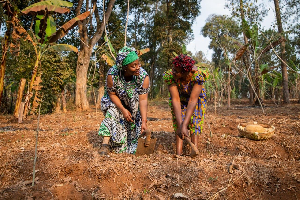Dr Isaac Amo-Antwi, a Takoradi-based Social Worker on Tuesday, commended the Ministry of Gender, Children and Social Protection for adopting proactive operational mechanisms for the implementation of Livelihood Empowerment Against Poverty Programme (LEAP).
Dr Amo-Antwi told the Ghana News Agency in an interview, on the sidelines of the launch of the Broiler Revitalisation Project in Accra, that focusing on three demographic categories: single parent with Orphan or Vulnerable Child, elderly poor, or Person With extreme Disability unable to work deserves commendation.
LEAP is a social programme, which provides cash and health insurance to extremely poor households across Ghana to alleviate short-term poverty and encourage long term human capital development.
LEAP started as a trial phase in March 2008 and began expanding gradually in 2009 up to date.
Fifty per cent of the programme is funded from general revenues of Government while donations from Department For International Development of the UK and the World Bank.
It is the flagship programme of Ghana's National Social Protection Strategy and is implemented by the Gender Ministry through the Department of Social Welfare.
Dr Amo-Antwi explained that LEAP households are poorer than the national average, and have unique characteristics.
He said 67 per cent of LEAP households are below the upper poverty line compared to 29 per cent of households in the Ghana Living Standards Survey (GLSS5) and 39 per cent of rural households in GLSS5.
He said unlike the generally poor in Ghana, LEAP households are significantly smaller, have fewer young children, but more orphans. LEAP household heads also tend to be much older, females and less likely to be married.
Dr Amo-Antwi noted that providing financial support in the form of direct cash payments and free health insurance through the new National Health Insurance Scheme makes Ghana’s flagship project unique.
Under LEAP, funds to cover enrollment in health insurance are transferred directly to the local health authority, which then issues cards to LEAP households.
He explained that in most cash transfers targeted at the ultra-poor and the vulnerable, the immediate impact of the programme is typically to raise spending levels, particularly basic spending needs for food, clothing, and shelter, some of which will influence children’s health, nutrition, and material well-being.
“Once immediate basic needs are met, and possibly after a period of time, the influx of new cash may then trigger further responses within the household economy, by providing room for investment and other productive activity, the use of services, and the ability to free up older children to attend school,” he observed.
“When the transfer is conditional on schooling and health service use, these outcomes will also increase provided that there is adequate monitoring or follow-up and participants are clearly aware of programme rules”.
Dr Amo-Antwi noted that experiences from LEAP show both negative and positive impacts in the wider economy.
The negative impacts include inflationary pressures exercised by cash transfers in conditions where markets had not been able to respond to increased demand, as well as the resentments and divisions fostered by targeted programmes that fail to include all those who consider themselves eligible.
On the positive impacts, Dr Amo-Antwi said non-beneficiaries have emulated the behaviour of participants, for instance, with regard to children’s education and health-seeking behaviour.
“They also operate through multiplier effects as the wider community benefits from the increased demand in the economy as a result of transfer programmes,” he said.
“One other impact that may have longer run, economy wide implications is associated with the growing reliance on new technologies in the delivery of transfer programmes and the increasing financial inclusion of poor people”.
Dr Amo-Antwi however cautioned against political manipulation of the programme for electoral expediency, saying, “any political exploitation of the project would endanger it, create animosity among the beneficiaries and non-beneficiaries”.
Business News of Wednesday, 16 July 2014
Source: GNA












